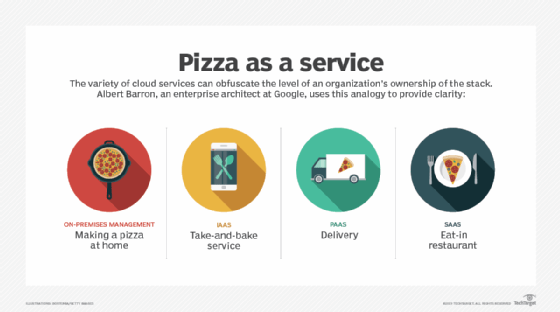cloud sourcing
What is cloud sourcing?
Cloud sourcing is an arrangement in which a company pays a third-party cloud hosting provider to deliver and support IT services that could be provided in-house. Cloud sourcing is similar to outsourcing, but the cost for cloud computing services is usually based on a per-use utility model instead of an annual or monthly contract.
Cloud computing refers to the delivery of hosted IT services over a network, such as the internet. It enables an organization and its users to access and deploy resources -- including virtual IT infrastructure, storage, software development tools and even full applications -- that are hosted by a third-party provider. This approach relieves customers of having to implement and maintain those resources in-house in a data center.
With cloud sourcing, an organization not only has access to hosted services, but generally relies on the cloud provider and its cloud infrastructure to support, maintain and manage those services on its behalf. This is like the service arrangement used in traditional IT outsourcing.
Why is cloud sourcing important?
Cloud sourcing is a model in which enterprises consume infrastructure instead of owning it. Cloud sourcing provides the following benefits:
- Cost reduction. The pay-as-you-go cloud computing pricing model reduces a business's capital costs. Companies do not have to buy as much on-premises technology and pay for third-party technology on an as-needed basis. They can also employ fewer on-premises employees for support and maintenance. Existing employees are freed to focus on more strategic projects while the cloud provider handles the service requirements.
- Reliability. Cloud sourcing improves service reliability through load balancing and redundancy.
- Data backup. Allowing a third party to handle data storage makes cloud backup and cloud data restore easier.
- Ease of access. Cloud sourcing gives employees remote access to files and data at any time.
- Flexibility. Cloud sourcing helps companies achieve economies of scale through flexible capacity and capacity on demand. Cloud services customers have access to a larger pool of third-party resources that can dynamically respond when they have increased requirements.
- Compliance. Cloud sourcing helps organizations achieve and maintain compliance with various laws and regulations related to corporate governance, sustainability, security and other processes. Cloud vendors frequently achieve compliance validation for specific regulations and can help ensure that customers meet regulatory requirements.
Types of cloud sourcing service models
Cloud sourcing can also take place in private clouds, hybrid clouds and public clouds. Cloud sourcing services are categorized by the type and level of service being offered, and are designated as anything-as-a-service, or XaaS, models.
The three most common cloud service models are the following:
Infrastructure as a service (IaaS) is where the cloud provider manages back-end computing tasks like storage and networking. IaaS is the model that gives the customer the most control. It also requires the most technical knowledge. Network architects and administrators are the primary users of IaaS.
Platform as a service (PaaS) delivers application development resources to customer organizations. PaaS offerings also include application testing and deployment and web service integration offerings. The cloud service provider provides a level of management with this model; customers control certain application resources and use PaaS to develop other applications.
Software as a service (SaaS) vendors host applications on their servers for customers to use. A business using SaaS does not have to set up or maintain an application; the cloud services provider takes on management responsibilities in this service model.

Some more specific cloud sourcing service models include the following:
Cloud sourcing pros and cons
Cloud sourcing provides a range of benefits. It lets an organization reduce on-premises infrastructure costs and increase operational efficiency and flexibility. It minimizes the time spent on manual and repetitive tasks, allowing IT teams to focus on projects with greater business value.
However, companies that use cloud sourcing also face some potential challenges, such as the following:
- Loss of control. An organization might be concerned about losing control over IT resources and business processes when it moves to a cloud sourcing model. This is particularly true when an enterprise has security and compliance requirements that a cloud service provider might not adequately meet.
- Relationship management. Cloud sourcing might require an organization to dedicate resources and staff to manage the relationship and the service-level agreements that come with it. Cloud sourcing requires customers to continuously monitor and assess performance and make consumption adjustments according to their needs. This dynamic, real-time view of the business and its relationship to the provider can be difficult to maintain.
- Service issues. Cloud service providers can have equipment failures and other issues that cause service interruptions and downtime.
- Security. If a cloud provider experiences a data breach, its customers' data might be at risk.
- Vendor lock-in. Cloud sourcing customers can find themselves tied to one vendor in ways that make it difficult to switch after committing to a particular service.
How is cloud sourcing used?
Here are examples of how the three main service models of cloud sourcing may be used.
- IaaS. Cloud services customers use IaaS for websites, databases, monolithic applications and containers. It is also used to provision virtual machines. IaaS essentially lets customers skip buying IT infrastructure.
- PaaS. PaaS is useful for creating custom applications, especially if multiple developers need to work on the same project. PaaS is also useful when integrating web services and databases, and when businesses need to scale up or down to adjust to varying development needs.
- SaaS. SaaS is used when companies require an application but don't want the burden of buying and maintaining the software. It is good for organizations that need a ready-made tool with automation to optimize and streamline simple tasks. For example, a startup or small business that must be productive quickly may use an e-commerce SaaS app to get up and running. SaaS is also good for short-term projects that don't require much customization or procurement.
Some of the leading cloud platforms providing cloud services are Amazon AWS, Google Cloud and Microsoft Azure.
What is the difference between cloud sourcing and outsourcing?
Cloud sourcing and outsourcing are similar in nature but also have distinct differences.
- Outsourcing is when a company hires a third party to perform business tasks, handle operations and provide services. It can apply to a wide range of business tasks and industries. For example, an internet publishing company could outsource the task of search engine optimization to an outsourcer that specializes in SEO.
- Cloud sourcing is similar to outsourcing but is limited to IT services that can be delivered using cloud technology. For example, virtual infrastructure, development tools and network storage can all be provided using a cloud-service that a third party owns and maintains. Like outsourcing, cloud sourcing is used when a company wants another business to handle certain tasks.
Security is a primary concern in cloud sourcing. Learn how the shared responsibility cybersecurity model guides the enterprise approach to cloud security for each of the three service models.






